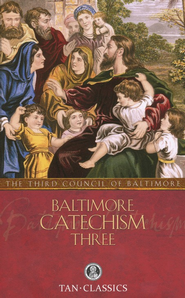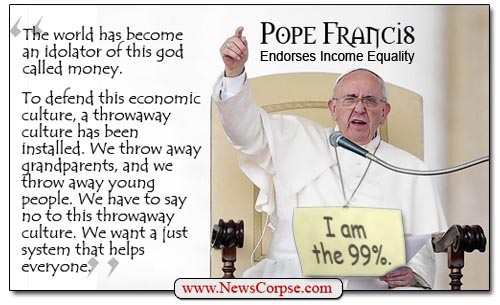The love of doctrine is the heart of Catholicism: You must love the Lord your God with all your mind, heart, and soul....and your neighbor as yourself.
Then you have no real reason for Christianity to exist, do you? After all, you've just quoted the story about Hillel when asked to explain Judaism on one foot - First the ve'ahavta, which you seem to think was a Christian invention, followed by "love they neighbor as thyself." At least I
think you meant to put the word "love" in there, by context. You're gone a little verbless in the above.
Were you Jewish, you could even quote the last line of the story about Hillel - "Now, go and study." That might be more in tune with your love of doctrine/dogma, but unfortunately, when Jews say "go and study," they mean learn the text but also learn to argue it, not to parrot it.
How can we love God if we disobey the faith that he gives us? To love God is to be obedient to God:
"If you love me, obey my commandments." - Jesus: John 14:15
Do you work on Saturdays?
Do you eat bacon, pork, or shrimp?
Do you wear garments woven of more than one fabric?
Do you worship only God alone, or a trinity
Don't be silly and say you keep God's commandments. You can say you keep to one or another set of made-up rules, but these aren't the commandments, according to the scripture.
I make no such claim, as I've thought for myself through the reasoning behind the
mitzvoth. You haven't. You just parrot words about "commandments" if they're convenient to an argument on the bulletin board.
Do yourself a favor - just convert to Judaism, then say "I'm not doing any of it." So far you've invented reform Judaism, in your attempt to lecture on the importance of Catholic doctrine.
That obedience that God requires from us is rooted in the Old Testament and is witnessed to us by Jesus in his obedience to the Father.
If you mean the Hebrew Bible, or the Tanakh, or if you like the Torah, of course it is. But your religion does not practice the commandments.
Doctrine is not an anchor but rather a roadmap to guide us in that path of obedience.
Obedience to
what? You have no respect for the
mizvoth. Stick with calling Catholicism and other sects of Christianity what they are -- a religion unto itself that substitutes one man's sacrifice for either the sacrificial cult of the Temple, the keeping of the Commandments, or in the modern context, the adherence to the moral heart of Judaism. For that matter, were you actually aware of the monotheistic requirement in the Hebrew bible, the most basic and first commandment, you'd know you couldn't invent a trinity and claim roots in the Torah.
The Catholic church is universal because she is the one bride of christ.
I'm not in it. Fail.
To those who are chosen, they know that she contains the fullness of truth........
In your "Old Testament" (a derogatory appellation you would never use, had you not long ago decided that God's commandments did not apply,) God makes his "chosen people" Israel -- that people we now call the Jews. Not Christians. Not Muslims. God makes a covenant with us: We will be his people, and He will be our God.
I don't say this to declare a special place; rather, I bring it up because you're claiming to use the Jewish formula, and to simply replace the "chosen people" with whichever "people" you belong with.
If you're going to have an exclusionary and somewhat offensive doctrine, couldn't you at least make up your own? Even if you want to do a xerox copy of Judaism, scratch out "Jews" and write in "Catholics" in crayon, couldn't you have the common courtesy not to say it's "rooted in" the books you're essentially abrogating?
nothing of which frightens, but all of which enlightens. A beauty that has no equal.....a beauty which the world will consider foolish and folly but which the believer knows to be the way to everlasting life.
Okay now you're on safe ground, this sort of rhapsodic claim about everlasting life. No actual content, but there's no original content up to this point, so no big loss there. At least you're on the familiar turf of promising immortality only to those who agree with you. Of course, "nothing of which frightens" doesn't seem an apt description of the usual Christian description of Hell. But why split hairs.
Francis is living that beauty in his life....all of it. His living witness of obedience to Catholic doctrine is a testament to his love of God and his love of neighbor. It is not a witness to the rejection of Catholic doctrine.
Francis is a good pope but has shown no special love of doctrine. Your long ramble claiming that because he's a good man, he must be some sort of doctrine-spouting ideologue is silly.
He's doing what Jesus said to do, and for those actions, I have no desire to pick on him. After all, as we keep establishing (over and over again, it seems,) Jesus' own sayings seem to have been those of a radicalized Jewish teacher of his time. Jesus had no clue that somebody was going to write books we call Mark, Matthew, Luke, and John, nor any of the rest of it. Jesus was likely much less concerned with what people would later make of his death, than with what he could teach.
I am sure Francis, like you, believe that Jesus takes the place of the temple sacrifices. Jesus did not believe that he took the place of the
mitzvoth; that was Paul's idea, decades later, when he fought against the idea that you must first be a Jew to be a Christian.
In that Francis
isn't concerned with thousands of years of distortions, but with what Jesus taught, he comes much closer than did (for example) Benedict, to this man who sought out and taught core Jewish concepts a couple of thousand years ago.
The fact that Catholicism has abandoned the
mitzvoth is not troubling to me; in large part, I have done the same. But I don't run around claiming to be a keeper of the doctrine; you, on the other hand, are making the specious claim that by reversing the requirements of the
mitzvoth, you are keeping them.
We had another false messiah named Shabbatai Zevi in the 17th century who claimed to do the same. The difference between him and Jesus is that Jesus didn't do so; it was his followers who did the heavy lifting on that lie. Jesus was, of course, a false messiah too, but at least he played it straight, rather than as a sort of farce.
I'm not a Sabbatean, and for good reason -- truth. I don't mind leaving behind commandments; but I'm not dishonest enough to claim that by breaking the commandments I'm
really the one who's keeping them.
To his credit, neither is Francis. He just does what he believes it's right to do, using the teachings of Jesus -- and to date, his most progressive ones -- as his guide.
Best. Pope. Evah.
PFnV





















